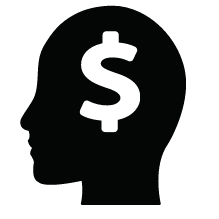
Opportunity Cost
Whenever you use a production factor it will have a cost. Why is that? The factors of production are limited, not unlimited. As a result, when you decide to use land, labor, capital, or entrepreneurship for one purpose, you lose the ability to use it for another purpose. Take, for example, labor – your own labor – as your own resource. Let’s say you can spend an hour writing a book, teaching a lesson, or knitting a cardigan. Suppose you prefer to knit a cardigan. You can neither write a book nor teach during this hour. If your second-best option is to write a book, economists say that the opportunity cost of an hour spent knitting a cardigan is an hour you can spend writing a book. Here, the opportunity cost of knitting a cardigan for an hour is reading a book for an hour.
Implicit and Explicit Cost
Opportunity cost is sometimes called implicit cost. In addition to the easily calculated explicit costs of a production activity such as labor, raw materials and overheads, there are also implicit costs that are more difficult to calculate.
Considering the Opportunity Cost
For example, on a beautiful Friday morning, you think, “I can go to work as I should, stay home and sleep all day, or fly to Hawaii, hang out at the beach and dive.” Imagine you decide to go to Hawaii and your second-best option is to go to work. What was the cost of your trip?
You paid for a taxi to the airport, airfare, hotel all-inclusive accommodation, and diving. These are the first to come to mind. So, was that your only expense? No. You’ve also given up any money you can earn by working. Opportunity costs give bad results. You should always be sure to take that into account when planning.
Assumptions in The Economy
Economists make some assumptions when talking about their favorite subject. They expect you to know (and accept) these assumptions. Important three of them are as follows:
1.Nothing else changes. When economists argue that “If income taxes decrease, consumption increases.” it should be understood as “If income taxes go down and nothing else changes, consumption will increase.”. You see the difference between the two expressions, right? The phrase “and nothing else changes” is also known as the ceteris paribus conjecture. Ceteris paribus, translated means “while all other elements are unchanged”. So, when reading about economics, keep in mind that all statements about cause and effect relationships are written with the assumption of ceteris paribus.
2. People are rational and act rationally. Another assumption that economists make and love is that people behave rationally. Economists assume that people make their choices considering all available information, as well as the benefits and costs of that choice. Also, economists assume that the choices make sense. The assumption that people behave rationally becomes the subject of debate between different schools of economic thought, but it is a useful assumption for most economic decisions.
3. People are selfish… The last assumption of economists is that people are self-interested. When it comes to deciding, people think of themselves first of all. Pure altruism is not possible in the economy. Economists cynically assume that human behavior is driven by self-interest. For example, suppose a grenade was thrown into a moat full of soldiers. Let a soldier jump on the bomb, sacrificing his own life to save the others. According to the economists, this soldier immediately calculated the marginal benefit and marginal cost of his decision, decided that the marginal benefit of rescuing his comrades would be more than the marginal cost of his life, and jumped on the bomb in a utilitarian act that maximized his personal interest. He saved his friends to maximize his usefulness as a soldier.
The assumptions made by economists are open to criticism and debate. Many critics think the field of economics tends to be too abstract and theoretical to have real-world values. The failure of most economists to predict the latest economic crash supports the notion that economics ignores human psychology.
Economics as a discipline has reached a turning point, and the assumptions that economists cherish require careful examination. Instead of being tidy, abstract and mathematical like physics, economics should be messy, complex and organic like biology.
Are you interested? You can follow my blog to read more posts about economics.
You may also want to read my THE BIGGEST FINANCIAL PROBLEM IN THE WORLD ECONOMY post.
Also check out these:
- WORK IN THE SAME FIELD BUT EARN MORE
- THE TWO MOST IMPORTANT SKILLS TO INCREASE YOUR INCOME
- YOU NEED TO SAVE MONEY
Here are my latests posts:
